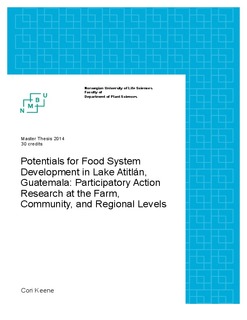| dc.description.abstract | This study explores potentials and constraints for farm and food system development in Lake Atitlán, Guatemala through participative research with smallholder farmers from three Mayan ethnic groups. Semi-structured interviews were conducted with 41 farmers in the Lake Atitlán watershed, and spatial interrelationships were analyzed at the household, community, and regional levels. Research that helps elucidate potentials for agroecological development with consideration for the experiences and knowledge of peasant farmers in the Global South is currently limited. This study utilized multiple research methodologies including Soft Systems Methodology, Participatory Action Research, and Grounded Theory Methodology, and provides both qualitative and quantitative results. Results implicate that vast food and resource scarcity coupled with immense changes such as globalization and environmental change have magnified the loss of traditional agricultural systems and exacerbated regional food insecurity. In accordance with these trends, farmer agency and subsequent adaptation strategies are emphasized. Furthermore, factors that may constrain or nurture future development are highlighted through SWOT analyses conducted by smallholders. The most compelling potentials for sustainable development identified in this study include macro-level influences such as the need for review of contemporary economic policies and land tenure, as well as the need for further research pertaining to climate change adaptation and resiliency. Regional potentials include food system relocalization initiatives, promotion of marginal traditional crops, community-based agrobiodiversity conservation networks, crop diversification, and organic agriculture. Conclusions highlight the importance of action and participative research frameworks for formulation of appropriate development initiatives in the Global South. | nb_NO |
